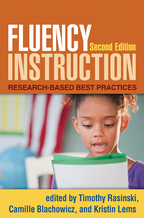Fluency Instruction
Second Edition
Research-Based Best Practices
Edited by Timothy Rasinski, Camille Blachowicz, and Kristin Lems
HardcoverPaperbacke-bookprint + e-book
Hardcover
orderApril 15, 2012
ISBN 9781462504411
Price: $77.00 334 Pages
Size: 6" x 9"
Paperback
orderApril 16, 2012
ISBN 9781462504305
Price: $51.00334 Pages
Size: 6" x 9"
“Fluency Instruction is one of my favorite books, and one I always keep at hand's reach. The second edition provides some wonderful additions to an already excellent work; new chapters on English language learners and adolescent learners are especially welcome. I have adopted this book as a text for our graduate-level course entitled 'Phonics to Fluency,' and it is also a wonderful resource for our undergraduate reading methods course. The book helps teachers and teacher candidates become better prepared to meet the needs of all learners.”

—William Dee Nichols, PhD, Professor and Head, School of Teaching and Learning, Western Carolina University
“With chapters from leading researchers and practitioners, this second edition addresses the latest theory, research, practices, and programs that influence fluency. It provides necessary information to help classroom teachers better understand the 'whats,' 'whys,' and 'how-tos' of fluency assessment and instruction. The editors dispel the misconception that fluency means reading fast or with expression, showing that fluency assessment and instruction must absolutely not be separated from comprehension. This excellent book is recommended for all classroom teachers and teacher educators who seek to enhance and develop the goal of reading—comprehension.”

—Rona F. Flippo, EdD, Department of Curriculum and Instruction, University of Massachusetts Boston
“The second edition has been thoroughly updated and features several new chapters. Updates reflect the changing demographics of today's classrooms and offer teachers and researchers insights into how best to teach fluency to students across grade levels with varying needs. This is one of the most comprehensive books on fluency available. It takes the reader from the history of fluency to instructional applications, including considerations for types of learners rarely discussed in previous literature.”

—William H. Rupley, PhD, Professor and Distinguished Research Fellow, Department of Teaching, Learning, and Culture, Texas A&M University
—William Dee Nichols, PhD, Professor and Head, School of Teaching and Learning, Western Carolina University
“With chapters from leading researchers and practitioners, this second edition addresses the latest theory, research, practices, and programs that influence fluency. It provides necessary information to help classroom teachers better understand the 'whats,' 'whys,' and 'how-tos' of fluency assessment and instruction. The editors dispel the misconception that fluency means reading fast or with expression, showing that fluency assessment and instruction must absolutely not be separated from comprehension. This excellent book is recommended for all classroom teachers and teacher educators who seek to enhance and develop the goal of reading—comprehension.”
—Rona F. Flippo, EdD, Department of Curriculum and Instruction, University of Massachusetts Boston
“The second edition has been thoroughly updated and features several new chapters. Updates reflect the changing demographics of today's classrooms and offer teachers and researchers insights into how best to teach fluency to students across grade levels with varying needs. This is one of the most comprehensive books on fluency available. It takes the reader from the history of fluency to instructional applications, including considerations for types of learners rarely discussed in previous literature.”
—William H. Rupley, PhD, Professor and Distinguished Research Fellow, Department of Teaching, Learning, and Culture, Texas A&M University



